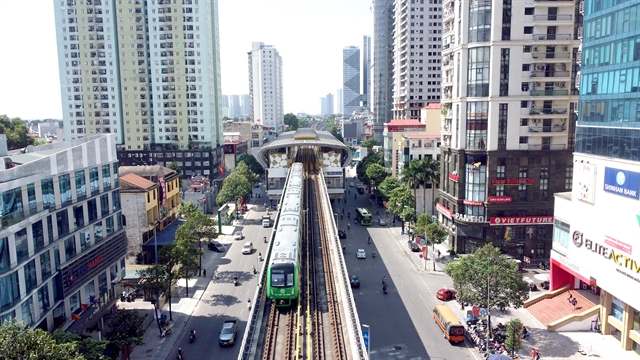 Society
Society

 |
| Experts are discussing how the cross-country high-speed train should be connected to urban transport in Hà Nội. — VNA/VNS Photo Huy Hùng |
HÀ NỘI — With the North-South high-speed railway in planning, experts are raising concerns about how the line should be connected to the city centre for the interest of the passengers.
It is recommended that the North-South high-speed railway should be connected to Hà Nội Station at the centre of the capital city, according to an initial planning report for railways routes and stations in Hà Nội by Transport Engineering Design Inc (TEDI) and Consulting Centre for Transport Development Investment (CCTDI).
A representative of the joint venture said that through research on railway planning in major cities across the globe, high-speed railways often run far into the city centre, such as in Tokyo, Beijing, Berlin and Paris.
The master plan for the national railway network for 2021-2030 with a vision to 2050 states that the North-South high-speed railway route will have Ngọc Hồi Station as its main station in the capital, situated in the outskirts of Hà Nội.
Concerns have been raised on whether Ngọc Hồi Station, located some 10km away from the city centre, could discourage passengers from using train services, especially those in the area north of the Red River.
Other suggestions include using the central Hà Nội Station as the passenger station, while Ngọc Hồi Station will also handle cargo and serve as the depot, instead of Thường Tín as in the plan.
Sharing the same perspective, Phạm Hoài Chung, deputy director of the Transport Development and Strategy Institute said that having the high-speed railway connected to the city centre will be more convenient to passengers, as almost no one wants to have to change trains multiple times while travelling.
He also pointed out the challenges in terms of infrastructure and utilisation when combining high-speed and urban railways.
Chung said: “The urban railway Ngọc Hồi-Yên Viên will be located next to the route to Hà Nội station, therefore research needs to be conducted on technical and technology solutions, ensuring the functional infrastructure and optimal train operations between two vastly different types of transport.”
Railway expert Nguyễn Ân, who worked at the transport ministry’s science-technology department, said that every option has its pros and cons.
He believed that the option to have Hà Nội Station as a passenger-only stop is the optimal choice for the city’s development, especially in passenger transport.
Ân agreed that this option could cause problems as the high-speed railway intersects inner city traffic routes.
He suggested that 10km of the railway be built underground, but noted that it will entail enormous costs and is time-consuming.
Detailed calculations should be made to compare this option with the plan to have Ngọc Hồi Station as the final stop with connections to the city centre through other means of transport.
A representative from the Vietnam Railway Administration also said that a proposal to build a four-rail route, with two for the urban railway and two others for the high-speed railway, has been submitted.
However, the city deemed the option unfeasible due to land clearance issues.
Therefore, for the upcoming pre-planning report, the consultant units are studying options that could allow for both the urban and high-speed trains on a double, elevated railway.
Deputy transport minister Nguyễn Danh Huy said that the North-South high-speed railway project is the first of its kind in Việt Nam, requiring careful and meticulous research to reach a decision on investment capital and method, technical factors and utilisation.
The Ministry of Transport also plans to invite experienced international experts to collaborate with local consultants for these studies to submit to the authorities for approval.
The submission is expected to be finished by 2025, according to Conclusion No 49-KL/TW of the Politburo. — VNS




